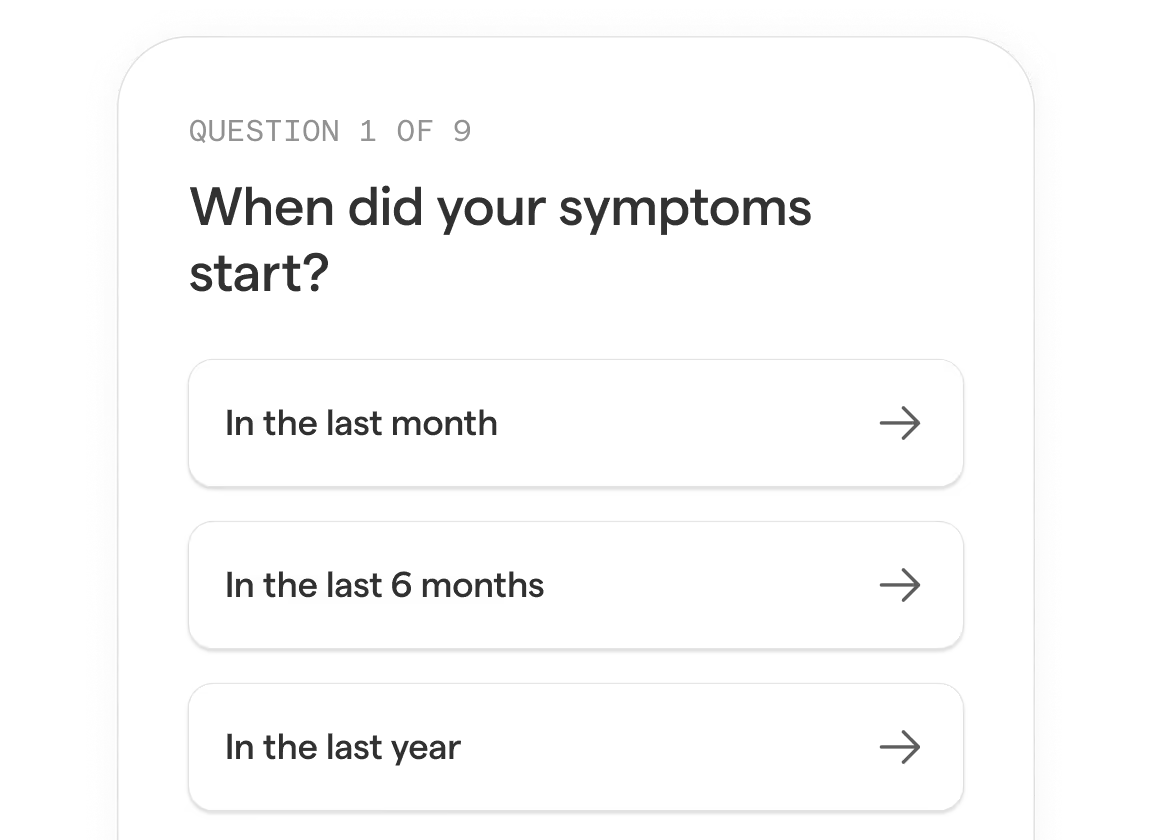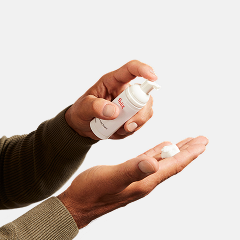Download the Felix App
Earn reward, visit our shop and get exclusive offers on the app
Download now


Through Felix, you can get Vagifem® 10 prescribed by a licensed healthcare practitioner with free delivery to your door.
Vagifem 10 is a medication that contains the hormone estrogen (estradiol).
It’s used as a treatment for the symptoms of vaginal atrophy, which is caused by low levels of estrogen in the body.
The Vagifem dosage recommended for you, will depend on what your healthcare practitioner believes is best for you, based on your current health and medical history.
For more resources, including a full list of the risks and benefits of Vagifem 10, please review the product monograph.
Vagifem 10 contains estrogen (estradiol), which is a natural hormone produced by women.
However, throughout the menopausal transition, the ovaries will slow and then stop production of estrogen.
In these cases, Vagifem 10 can be used to replace this missing estrogen and help reduce dryness or vaginal pain during the menopause transition.
Vagifem 10 is indicated for use as a treatment to help treat the symptoms of vaginal atrophy due to low estrogen. It’s also used to reduce certain menopause symptoms, in people that are either perimenopausal or menopausal.
It does this by replacing estrogen that is missing from the body, due to the natural changes that occur during the menopausal transition and life stage.
Each 10mcg dose of Vagifem 10 comes preloaded into the applicator for use.
Vagifem vaginal estrogen tablets are designed to be used as vaginal inserts, which means that they need to be inserted into the vagina to work.
If you have any questions about how to use the applicator, you should talk to your healthcare practitioner at Felix.
They’ll be able to give you any additional direction you need to comfortably and effectively use your Vagifem vaginal pills.
Many people that use Vagifem 10 won’t experience any side effects from use.
However, it is possible that you could experience:
If any of these side effects become severe, you should talk to your healthcare practitioner right away. They may want to suggest an alternative menopause treatment that could work better for you.
Menopause Hormone Therapy (MHT) with Vagifem 10 and estrogen-therapy can increase the risk of other conditions that you should know about. MHT is the most effective treatment for menopausal symptoms and has been shown to prevent bone loss.
In menopausal women who start appropriately-dosed MHT prior to age 60 OR within 10 years of their last period, the health benefits outweigh the risks.
Risks of MHT are considered very rare (~1 case per 1000 to 10,000 women on MHT per year) and may include:
These conditions are all rare, but they highlight the importance of having a full discussion with your healthcare practitioner; especially if you’re experiencing moderate to severe side effects.
Individualization is key, and your MHT treatment plan should be reassessed (at least) once a year to monitor your health, as well as ensure that you are on the correct dosage and formulation. Your practitioner can help you find balance between treating your symptoms safely, and avoiding increased risks
You shouldn’t use Vagifem 10 if:
In addition to these concerns, you should be sure to talk to your healthcare practitioner before starting Vagifem 10 if you:
These other factors could increase your risks of experiencing negative or severe side effects. However, your healthcare practitioner may be able to suggest alternative menopause medications, which will work better for you based on your health and medical history.
Tell your healthcare professional about all the medicines you take, including any drugs, vitamins, minerals, natural supplements or alternative medicines. The following may interact with Vagifem® 10:
Further reading








In Canada, to get a Vagifem prescription, you must first speak with a licensed healthcare practitioner, like the experts at Felix.
Felix is making this process quick and convenient for Canadians by providing online assessments with licensed healthcare practitioners.
If they believe that Vagifem 10 is right for you, based on your health and medical history, they can offer you a prescription.
Yes, you can. However, to get a Vagifem 10 prescription online in Canada, you must first speak with a licensed healthcare practitioner, like the ones you’ll find at Felix.
If the practitioner believes that Vagifem 10 could be right for you, based on your current health and medical history, they’ll be able to provide you with a Vagifem 10 prescription.
No, Felix is eliminating the need for long wait times at doctor’s offices, or to wait weeks for a routine appointment.
Just complete an online assessment, and if your healthcare practitioner believes that Vagifem 10 is right for you, they’ll be able to write you a prescription.
Best of all, Felix can deliver your medication directly to your doorstep, at no extra cost.
In order to buy Vagifem 10 online in Canada, you must first have a prescription from a licensed healthcare practitioner, like those at Felix. Complete an online assessment, and if your healthcare practitioner believes Vagifem 10 is right for you, they can write you a prescription for it. Best of all, Felix can deliver your medications discreetly to your home, at no additional cost to you.
No, Vagifem 10 is not available over-the-counter in Canada. This means that you’ll need to speak with a licensed healthcare practitioner in order to access this medication.
Thankfully, Felix is making this process comfortable and seamless for Canadians. Just complete an online assessment with one of Felix’s healthcare practitioners.
If they believe Vagifem 10 is right for you, they can provide you with a prescription, and then have your medication shipped to your home for free.
This is a question that’s best asked to your insurance provider, since each person’s coverage will look a little different.
The good news is that if your insurance company does cover Vagifem 10, Felix can bill your insurer directly, and then deliver your medication right to your door. No pharmacy pick-up required.
It's important to note that insurance coverage for online medications through Felix doesn't include the cost of your assessment.
Felix is Canada’s first truly integrated healthcare platform. We provide on-demand treatment for everyday health needs like weight loss, mental health, sexual health, and more. Founded in 2019, our digital-first approach to healthcare includes everything from diagnosis to prescription — all accessible from the comfort of home.
No. Felix provides a faster, hassle-free way for you to get a treatment plan for certain conditions, but our service does not replace your primary care provider. For matters that extend beyond obtaining a lifestyle treatment safely and easily, we encourage you to consult your primary health practitioner in person — whether for checkups, personal health concerns, or to inform them about your current treatments or treatment plans.
Absolutely. Our online assessments have been designed to ask all the necessary questions required for diagnosis. We've worked with specialists to create an assessment process that can provide sufficient information for the healthcare practitioner to determine whether or not you are eligible for a prescription and craft an appropriate treatment plan.
Call 911 or proceed to your nearest emergency room immediately. Felix is not intended for medical emergencies. Once the emergency has been addressed or resolved, contact your prescribing practitioner to inform them of your experience as this may impact your current treatment plan.
Anyone who is 18 years or older (16 or older for acne and birth control prescriptions), and is located in Alberta, British Columbia, Manitoba, Newfoundland and Labrador, Nova Scotia, Prince Edward Island, Saskatchewan or Ontario. We cannot ship treatments outside of these provinces at this time.
After creating an account, you will complete a medical assessment for evaluation by one of the Felix healthcare practitioners.
During your assessment, you will have the opportunity to send your practitioner questions via secure messaging.
In most cases, practitioners will complete your assessment with secure messaging alone but sometimes they may determine you require an audio or video visit and/or further diagnostic testing to help determine the best treatment plan for you.
If your practitioner has determined a prescription treatment is appropriate, they will approve your visit and write you a prescription. Our pharmacy will then ship your prescription to your home.
You’ll be able to message your healthcare practitioner if you have questions or want to make changes to your treatment at any time.
No. We use an asynchronous telemedicine model so you can complete your online visit in your own time and we save your progress so you can come back later to finish it.
If you are completing a visit in the mental health or weight loss categories, your healthcare practitioner may require a phone or video call to discuss your medical profile further during the assessment process.
Most assessments do not require a phone or video conversation. Once a prescriber has reviewed the info in your assessment they will respond to you via secure instant messages that you can access within your Felix account.
If you are completing a visit in the mental health or weight loss categories, your healthcare practitioner may require a phone or video call to discuss your medical profile further during the assessment process.
You can expect to receive a response from a healthcare practitioner within 24 hours of submission. If you’ve been waiting longer than this, please reach out to our Patient Support team through the chat bubble in the bottom right corner of your account or our Contact Us page.
No. A visit with a licensed healthcare practitioner is required for all treatments currently provided through Felix’s service.
Not long. After completing your assessment, a practitioner will generally respond within 24 hours, and often much sooner.
Treatment plans will be processed within 2-4 business days of your approval date if there is nothing blocking fulfillment.
All packages are shipped via Express Post, which usually takes 2-3 business days. You will receive an email with your tracking number once your treatment has been shipped.
Absolutely. All Felix shipments arrive in a nondescript blister package so you can have your treatment shipped wherever makes sense for you as long as there is someone there to sign for it.
A signature upon delivery may be required.
There is currently no cost to have your treatment shipped to you from our Felix Pharmacy network.
Yes, your security is paramount to Felix’s mission. Personal health information provided during your medical assessment is strictly and legally confidential between you and the Felix healthcare practitioner.
Beyond that, all your account information (including the medical assessment, credit card, and shipping information, etc.) is also stored safely and securely. Felix is compliant with all federal and provincial health privacy legislation. It is our duty to protect your data with comprehensive security infrastructure and stringent data policies to ensure it stays private and secure.
Read more on our Privacy Policy.
Yes! In Canada, only a licensed healthcare practitioner can write a prescription, and only a registered pharmacist can fill that prescription. We are supported by leaders in the Canadian pharmacology and specialized medical fields. Felix adheres strictly to all the regulations set forth by all applicable Colleges of Pharmacists and Colleges of Physicians and Surgeons in which we operate.
Absolutely. All prescriptions obtained via Felix are provided by licensed Canadian healthcare practitioners—the same as you would get at a hospital, doctor’s office, or clinic. These practitioners do not provide prescriptions unless they deem it medically safe and appropriate to write them based on your medical profile and assessment answers. Our assessments have been crafted by the practitioners on our medical team. Finally, all Felix Pharmacies are provincially accredited just like any retail pharmacy.
Your privacy is our top priority. All your data is 256 bit SSL/TLS encrypted, and we take significant steps to keep your data secure. You can read our Privacy Policy for more information.
Felix charges a fee for the online visit. In most cases the fee is $40 but varies by treatment category. The visit fee includes a prescription valid for up to a year (depending on the condition) and on-going support from the healthcare practitioner or pharmacist.
It depends. Treatment costs vary but will be in line with what you would pay at a pharmacy in person. You will see the estimated cost of your treatment before insurance, during the online visit but will only be billed for medication costs for your prescription once it is approved and sent to our pharmacy. Once approved, your treatment and payment will be processed within one to two days.
Keep in mind that you won’t necessarily need to pay the full price yourself. If you have insurance, Felix’s partner pharmacies will bill your insurer directly. You may also be eligible for financial support in your province.
We accept all major credit cards for any aspect of your treatment not covered by insurance or other financial support
Treatment coverage varies greatly between different insurance plans.
The good news is that if you are covered, Felix can bill your insurer directly, and then process your treatment plan at no additional cost to you. We recommend that you upload your private and/or provincial benefit card during the online visit so that our pharmacy partner can apply any coverage you are eligible for before processing your treatment plan.
Insurance coverage for treatment plans through Felix doesn't include the cost of your visit.
A Felix online visit is considered asynchronous since it is conveniently completed through a secure chat bases system. Currently, asynchronous visits are not covered by insurance or provincial health plans so you will be charged a visit fee, depending on the category of treatment you are requesting.
Medication coverage varies greatly between different plans, provinces, and has specific criteria that determine eligibility. For private insurance, we recommend contacting your benefits administrator with your details and the Drug Identification Number (DIN) and the drug name to determine your coverage.
For more details on provincial health plan coverage see below:
Alberta: Learn more about AHCIP here. Search for covered drugs here.
British Columbia: Learn more about MSP here. Search for covered drugs here.
Manitoba: Learn more about MHSIP here. Search for covered drugs here.
Newfoundland and Labrador: Learn more about MCP here. Search for covered drugs here.
Nova Scotia: Learn more about MSI here. Search for covered drugs here.
Ontario: Learn more about OHIP+ here. Search for covered drugs here.
Prince Edward Island: Learn more about Health PEI here. Search for covered drugs here.
Saskatchewan: Learn more about Saskatchewan Health Coverage here. Search for covered drugs here.
OHIP+ covers some birth control for eligible residents of Ontario who are under 25 years old and do not have private insurance. You can check if your birth control medication is covered here. Make sure to upload your Ontario health card during your online visit so our pharmacy partners can apply your coverage directly.












